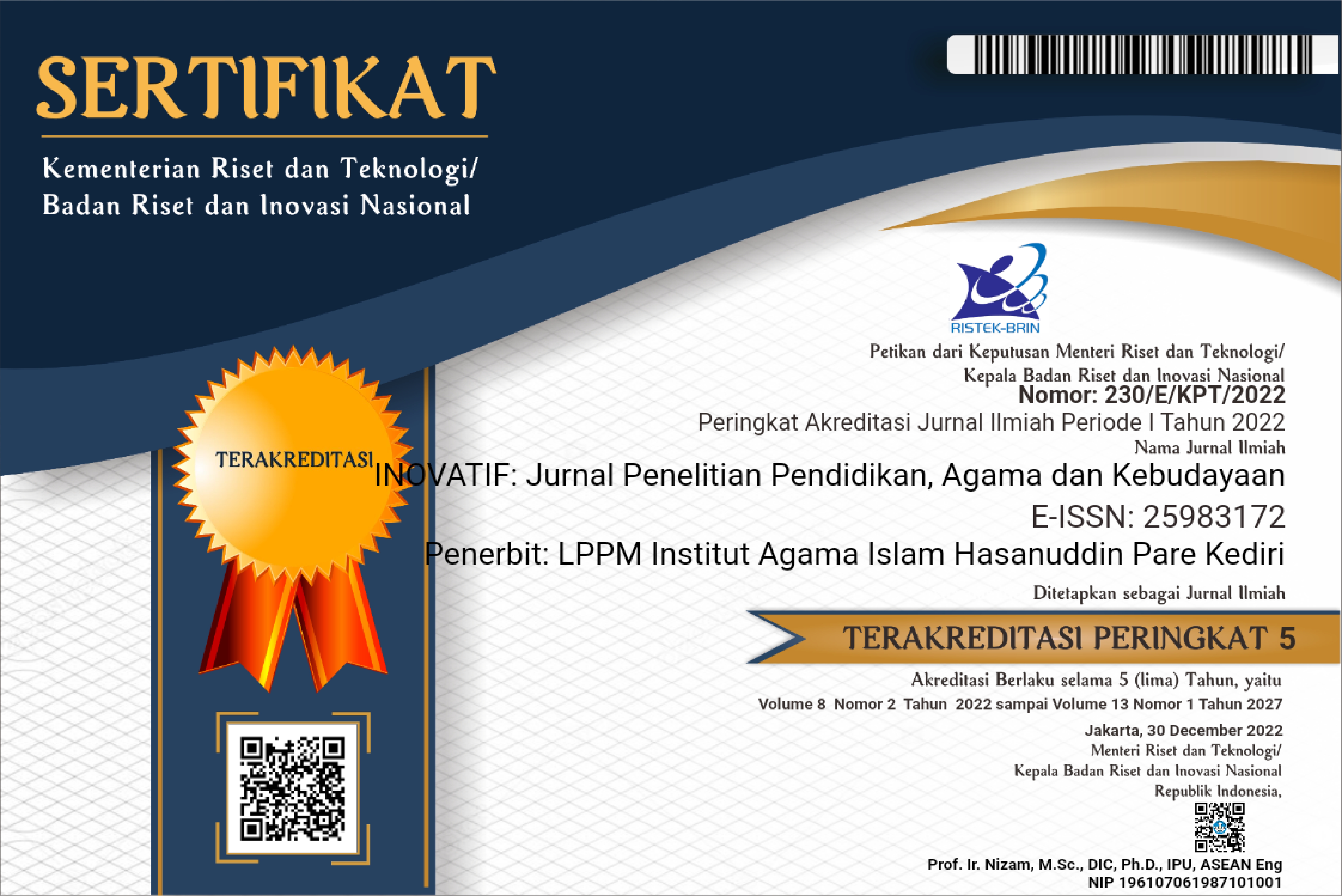Implementasi Program Akselerasi dalam Pembelajaran PAI di Sekolah Umum
Abstract
Acceleration program (acceleration learning) is one form of educational services best for students who have extraordinary ability and intelligence as a space for them to express their potential and become a competition forum between them to show the best so that the uniqueness of gifted children will appear in the learning process. It is also said by E. Mulayasa that the accelerated service program is one of the special programs organized by schools as an attempt to handle gifted children who differ from othes. The focuses of this study are: 1. what are the Components of the implementation of Acceleration Program in Islamic Education Learning? 2. What are the factors supporting and inhibiting the Implementation of Acceleration Program in Islamic Religious Education Learning?. The conclusions of this study are 1. Components on Implementation Acceleration Program In Learning Islamic Religious Education are: a. Recruitment process b. Learning activities c. curriculum used d. Evaluation. 2. Supporting Factors and Inhibitors of the Acceleration Program Implementation in learning Islamic Religious Education are: a. Supporting Factor: the existence of guidance and counseling programs. b. Inhibiting Factors: 1) Lack of student knowledge related to religious material Student personality. 2) Teachers have not been able to meet the needs of accelerated students. 3) The low competence and professionalism of teachers. 4) A one-sided view of the PAI lesson. 5) The low mastery of teachers to media-based learning information technology (IT). 6) Lack of Master's creativity in developing learning method.
Downloads
References
Arikunto, Suharsimi. 2002. Prosedur Penelitian Suatu Pendekatan Praktis. Jakarta: PT. Bima Karya.
Direktorat Pendidikan Dasar dan Menengah. 2003. Pedoman Penyelenggaraan Program Percepatan Belajar. Jakarta: Departemen Pendidikan Nasional.
Hawadi. 2001. Kurikulum Berdiferensiasi. Jakarta: Grasindo Widiasarana Indonesia.
Hawadi, R.A (Ed). 2004. Akselerasi: A-Z Inforamasi Program Percepatan Belajar. Jakarta: Grasindo Widiasarana Indonesia.
Koentjaraningrat. 1997. Metode-metode Penelitian Masyarakat. Jakarta: PT. Gramedia Pustaka Utama.
M.L. Oetomo (dkk). Hasil Penelitian. 2002. Peran Orang Tua dan Guru dalam Proses Mengidentifikasi dan Menangani Anak Berbakat.. http://www.gogle.com(online)
Moeleong, Lexy J. 2000. Metode Penelitian Kualitatif. Bandung: PT. Remaja Rosyda Karya.
Muhaimin. 2005. Pengembangan Kurikulum PAI: di Sekolah, Madrasah dan Perguruan Tinggi. Jakarta: PT Raja Grafindo Persada.
Mulyasa, E. 2004. Kurikulum Berbasis Kompetensi. Bandung: PT. Rosyda Karya.
Nazir, Mohammad. 1988. Metode Penelitian. Jakarta: Ghalia Indonesia.
Santoso, Gempur. 2005. Fundamental Metodologi Penelitian Kuantitatif dan Kualitatif. Jakarta: Prestasi Pustaka.
Setyosari, P. 2001. Rancangan Pembelajaran Teori dan Praktik. Malang: Elang Mas.
Siskandar. 2001. Kurikulum Program Percepatan Belajar. (http://www.google.com online).
Suharsongko, M. Edi. Jangan Paksakan Anak Masuk Kelas Akselerasi. Kompas: 27/05/2005. (http://www.google.com online)
Sudjana, Nana. 1989. Metode Statistik,, Bandung: Tarsito.
Tirtonegoro, Sutratinah. 2001. Anak Supernormal Dan Program Pendidikannya. Yogyakarta: Bumi Aksara.
Please read Copyright Notice for Inovatif: Journal of Research on Religious Education and Culture





